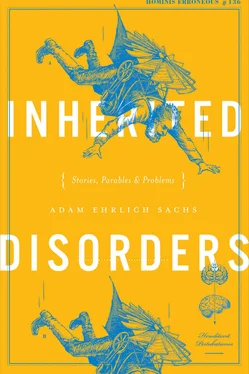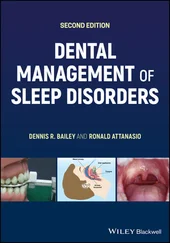There has been plenty of speculation about his motives. Some say his father, who died young, failed to pass on the family secret. Others believe Hirsch had been told that the dye was toxic but couldn’t believe it, couldn’t believe that his family was capable of such villainy. A third camp thinks Hirsch had been told the secret, believed it, and wanted to atone for the family sins in a “poetic” manner, by eating a bunch of his own colorant and suffering the consequences in public. Whatever the reason, that is what happened Thursday in his family’s atrium, surrounded by their stunted Japanese trees. After 70 sausage casings his spleen shut down, after 110 casings his kidneys failed, and as he ingested his 233rd casing, his heart exploded. When his body was cut open by the coroner it was found to be filled with tumors.
The company, headed now by Adam Hirsch’s son, has issued a press release announcing that it would halt production of Orange 6 temporarily, pending further study of its possible effect on the human body.
…………………….
A Las Vegas illusionist who rose to fame in the 1980s and ’90s with a series of televised stunts — including jumping from an airplane without a parachute, hanging upside-down from a crane in Times Square for forty-four hours without a safety net, and crossing the Grand Canyon on a high wire without a harness — pitched last week to ABC, NBC, and CBS a stunt in which he would discuss politics and modern-day society with his octogenarian father for ten straight hours, without, he said, a safety harness. He would discuss power, money, unions, war, Social Security, human nature, anti-Semitism, and the JFK assassination, among other topics, with his elderly, extremely frustrated father for ten hours without a break, and with no harness. At the end of the discussion, he would jump onto a landing platform, where he would receive careful medical attention. The illusionist called it his “greatest stunt yet,” though all three networks ultimately passed on his pitch.
…………………….
Last year we read about the enormous bequest, rumored to exceed $50 million, that promised to rescue the Metropolitan Opera from the brink of insolvency. This year the bequest was challenged in court by the benefactor’s son, a self-described actor, spoken-word poet, and performance artist, who claimed that his father had never shown any interest in opera, or, indeed, any of the performing arts. His lawsuit claimed that his father had been manipulated by his third wife, whom the son referred to only as “the Russian woman,” into removing him from the will and funneling his former inheritance toward the opera — an art form the father, according to the son, had never understood or appreciated.
Opera supporters feared the worst. The son’s case seemed solid, especially since the father was mentally enfeebled in his last year, when the will was changed.
But the court proceedings took a strange turn.
The son’s lawyers, the most talented team of litigators in the country, focused at first on arcane aspects of estate law and appeared, as anticipated, to be winning the case. The Metropolitan Opera looked to be doomed. But after week one of the trial, the son fired all of his lawyers and insisted on arguing the case himself. He called himself to the stand and interrogated himself at length about the high school performance of The Music Man , twenty years prior, in which he had played Harold Hill. His father, who had promised to attend, went instead on a last-minute business trip to London and missed all four performances, including the Saturday matinee.
The son then called to the stand a musical theater expert and asked him a single question: Was, or was not, Harold Hill the main character in The Music Man ?
He was, the expert said.
The judge ruled all of this testimony irrelevant and inadmissible and ordered the son to pursue a more pertinent line of questioning. When the son refused to speak about anything other than The Music Man , the size of the Harold Hill role, and the last-minute London business trip, the judge held him in contempt of court and threw out the lawsuit.
The dramatic way in which the son was dragged from the courtroom, screaming about a classmate who played a mere townsperson of River City but whose father had managed to attend all four performances, led some to suspect that his entire case had been a piece of performance art. In a coy interview this month the son seemed to imply as much, and hinted that he’d always intended for his “brothers and sisters in the opera” to keep his father’s money. Others believe this to be an obvious face-saving tactic; opera supporters, in particular, have scoffed at the son’s ex post facto attempt to turn the trial into some sort of modern art piece. At any rate, the Metropolitan Opera remains, to their relief, flush with funds, and has supposedly lined up a spectacular season, ending with Wagner’s Lohengrin .
…………………….
The son of a famous Swiss strongman was born with a suite of physical deformities. His father, who’d once been able to clean and jerk 173 kilograms, felt now that his enormous, powerful body was an obscenity, and in sympathy for his son he let it waste away, in fact rather dramatically. Soon the sympathetic strongman was nearly as weak as his son, then he was just as weak as him, and shortly thereafter he dropped dead. The coroner actually wrote down as the cause of death: Strongman’s sympathy for son . Needless to say, when the son grew up and found out what had happened to his father, he developed — in addition to the suite of physical deformities — a set of mental disorders.
…………………….
A German composer whose earliest songs and sonatas had been dismissed as trifling and derivative, and whose father had begun to suggest, in his exceedingly gentle way, that he look into business or the law, went in 1924 to live in a timber hut beside a lake in the north of Finland, where over the course of several years, in perfect solitude, he pioneered an ingenious method of composition, very, very different from Schoenberg’s chromaticism, if superficially of course somewhat similar to it.
He returned to Leipzig in 1927 with his Piano Sonata No. 4, imagining the whole way home his father’s teary-eyed rapture when he plopped down at the family’s little upright piano and played for him, quite casually, his groundbreaking new piece. But upon his arrival he discovered, to his horror, that in consequence of a locomotive whistle sounding too close to his head his father had gone, at some point during the son’s Finnish sojourn, completely deaf.
Unable to play the piece for his father, the composer cast about desperately for other means of transmitting its essence into his father’s head. First he described the piece, its theoretical innovations, the crucial ways in which it diverged from Schoenberg; next he asked his father to observe please the faces of two delighted listeners; then he had him place his cheek to the piano as he played the piece in order to feel its vibrations. Yet none of this was capable of actually transmitting the essence of the piece into his father’s head, even though that head was constantly nodding and smiling and producing statements like: “I’m sure it’s a very nice piece, and not just nice but important.”
Finally the composer came to recognize that his sonata could only be absorbed as art, not as theoretical explanation, secondhand observation, or cranial vibration. And while art for the ear could no longer reach his father, there was still, was there not, art for the eye.
Читать дальше












